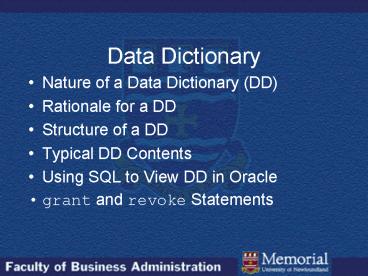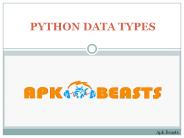Data Dictionary - PowerPoint PPT Presentation
1 / 16
Title:
Data Dictionary
Description:
A database contains information about entities of interest to users in an ... to anil; grant select on agents to public; /* Provides every user the privilege ... – PowerPoint PPT presentation
Number of Views:128
Avg rating:3.0/5.0
Title: Data Dictionary
1
Data Dictionary
- Nature of a Data Dictionary (DD)
- Rationale for a DD
- Structure of a DD
- Typical DD Contents
- Using SQL to View DD in Oracle
- grant and revoke Statements
2
Nature of a DD
- A database contains information about entities of
interest to users in an organization - When created, the database itself becomes an
entity about which information must be kept for
various data administration purposes - Data dictionary (or system catalog) is a database
about the database - Contents of a DD are commonly referred to as
metadata - DD can be updated, queried much as a regular
database - DBMS often maintains the DD
3
Rationale for a DD
- Provides a summary of the structure of the
database - helps DBA manage the database
- informs users of database scope
- Facilitates communication between users and
database administrators - Allows the DBMS to manage the creation, access,
and modification of tables and their components
4
Structure of a DD
- DD can be integrated with the DBMS or stand-alone
- Relational systems all have some form of
integrated DD (e.g., Oracle) - Integrated DD is usually active, meaning it is
automatically updated to reflect changes in the
database - A stand-alone DD is not directly linked to the
database and must be updated manually
5
Typical DD Contents
- Data elements
- names, data type
- Tables
- owner, creation date, access specifications, size
- Indexes
- name, attributes involved, creation date
- Authorized users
- names, type(s) of access
- Integrity Constraints
6
Using SQL to View DD in OracleSome Oracle DD
(Catalog) Tables
- SYS.OBJ
- contains, for each database object, such data as
object name, owner (number), creation time - Can view details with
- describe sys.obj
- Sample query
- select name, ctime
- from sys.obj
- where ctime gt 01-feb-02
7
Using SQL to View DD in OracleSome Oracle DD
(Catalog) Tables
- SYS.COL
- Contains, for each column, such data as data
type, table, whether nulls are allowed, and
position in table - View with
- describe sys.col
- Sample query
- select obj
- from sys.col
- where upper(name) city
8
Using SQL to View DD in OracleSome Oracle DD
(Catalog) Tables
- SYS.IND
- Contains the indexes defined for every table
- describe sys.ind
- select i.ind, o.name
- from sys.ind i, sys.obj o
- where i.obj o.obj
- select count() from sys.ind
- SYS.USER
- Contains name, password, and other information
about each user - select password from sys.user
- where name jparsons
9
Using SQL to View DD in OracleSome Oracle DD
(Catalog) Tables
- SYS.VIEW
- Contains information about defined views
- describe sys.view
- select from sys.view
- SYS.TAB
- Contains administrative information about tables
- There are many additional system tables in the
Oracle data dictionary
10
Using Comments to DescribeDatabase Objects
- COMMENT ON statement
- Can put comments on each database object as a
general description of that object - comment on
- table orders
- is Contains all unfilled orders
- comment on
- column orders.dollars
- is Total value qtyproducts.price
11
Using Comments to DescribeDatabase Objects
- select comment from sys.com
- where col is null
- and obj in
- (select obj from sys.obj
- where name orders)
- The DD contains a lot of information we may not
want to be generally available - Possible to create views such that users can see
data related only to tables created by themselves - Tables owned by sys (the DBA) are not generally
available to ordinary users
12
Sample Queries on the DD
- Can a particular user create a table with a
particular name, or has s/he already used that
name? - Which views are based on more than one base
table? - Finally, one to show you we have not covered
everything there is to know ... - How much storage space is still free in the
entire database? - select sum(f.lengthts.blocksize)
- from sys.ts ts, sys.fet f
- where ts.ts f.ts
13
grant statementconnect, dba, resource
- Several versions of grant statement
- connect allows new users to have access to
Oracle - grant connect to jeff
- identified by pwxx4r
- resource allows users to create their own tables
with all privileges (see later) on those tables - grant resource to veda, greenthing
- / Assumes veda and greenthing exist
- dba execute all commands on all database objects
- grant dba to mom, dick, mary
- identified by dad, ehsg, plymouth
14
grant StatementTable Privileges
- Allows owner of a table to control access by
other database users to data in the tables - Types of access include
- select allows users to select from specified
table - insert, delete, update, index, alter
- references allows user to define foreign keys on
specified table - all allows user all privileges specified above
- with grant option clause allows recipient to pass
the privilege on
15
grant StatementTable Privileges
- grant insert on orders to paul
- with grant option
- grant insert, delete, update
- on customers to marilyn
- grant update (quantity)
- on products
- to anil
- grant select on agents to public
- / Provides every user the privilege /
16
grant and revoke Statements
- All table privileges are stored in a table called
TABAUTH with primary key SEQUENCE - Update privileges on columns are stored in
COLAUTH - revoke statement withdraws privileges previously
granted (connect, dba, resource, table
privileges) - revoke dba from dick
- revoke resource from greenthing
- revoke delete on customers from marilyn
- revoke select on agents from public































